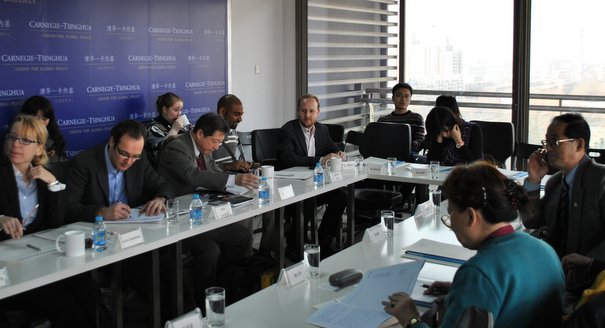Registration
You will receive an email confirming your registration.
IMGXYZ3703IMGZYXChina’s involvement in conflict-affected nations has drawn a mix of praise and criticism. The extensive investments China has made in infrastructure and trade provide the means for stabilizing these countries. At the same time, China’s growing involvement has been criticized for being focused on profits at the expense of stability and political accountability. In the thirteenth installment of the “China-South Asia Dialogues” seminar series, the Carnegie-Tsinghua Center for Global Policy and Saferworld held a joint roundtable discussion on China’s role in the conflict-affected states of Nepal, Sri Lanka, and Sudan. Carnegie’s Lora Saalman moderated.
China’s Role
One of the Chinese panelists argued that China continues to regard itself as a developing nation. Nonetheless, he stressed that as a regional power China’s rapid development has obligated it to play a responsible role in both local and global affairs. According to his view, China’s aim is not to assert itself as a hegemonic force, but rather to provide assistance to other developing nations.
- Foreign Assistance: A Chinese expert detailed the three phases of Chinese foreign involvement: From the 1950s-1970s, China supported independence and guerilla movements; From the 1980s-1990s, China focused primarily on domestic affairs and economic development, paying little attention to conflict-affected states; Since 2000, China has entered a new phase, focusing on maintaining a pragmatic, primarily trade-based relationship with these countries.
- Peaceful Coexistence: China places a premium on non-intervention, reciprocity, and mutual benefits, explained one Chinese panelist. Another Chinese participant noted that China’s flexible policy enables cooperation with the West to provide foreign assistance in countries like Nepal, Sri Lanka, and Sudan. This broad-based interaction can cover such arenas as high-level political exchanges, trade, investment, infrastructure, agriculture, education, technology, culture, medicine, peacekeeping, and non-traditional security, he explained.
- Cooperation with Europe: A Chinese expert noted that there exists both competition and cooperation when it comes to Chinese and European interests in conflict-affected states. Still, he argued that all actors maintain common interests of peace and political stability, economic recovery, and development. He recommended that interested parties abandon their outdated concept of a zero sum game, engage in greater consultation and coordination, and desist from providing weapons and ammunition to these regions.
Sri Lanka
- History of Conflict: Conflict in Sri Lanka stems back to its colonial past and a series of broken peace agreements since 1965. While the last civil conflict ended in 2009, Sri Lanka remains vulnerable, with over 280,000 displaced refugees and accusations of human rights violations. The process of resettlement promises to be a long one, argued one panelist. A Chinese expert commented that when faced with such crises, the tendency in Sri Lanka is to look to India first and to China second for assistance. A Carnegie participant commented that this dynamic might be shifting, given that China is now Sri Lanka’s number one financier.
- Intervention by Invitation: One of the Chinese panelists argued that China only intervenes when invited by local governments. When countries like Sri Lanka have requested assistance, whether economic or military, China has felt compelled to get involved, particularly when such countries have faced decades of conflict and threats to their national integrity.
Nepal
- Constant Upheaval: One of the Chinese experts argued that China’s ultimate goal for Nepal is to achieve lasting peace and stability. Economic support is the most crucial benefit that China can provide, he suggested, noting that Chinese investment in Nepal has grown by 80 percent, with most of that money invested in developing human capital. Most notably, argued this expert, China has given no preconditions for its foreign assistance to Nepal.
- Strategic Location: A Chinese panelist emphasized the strategic location and importance of Nepal, which is situated between China and India. This geographical proximity to China’s western regions gives Beijing an interest in maintaining stability in Nepal to benefit its own domestic situation, argued one Chinese expert. An Indian panelist expressed the view that India is not opposed to China’s role in such countries, but remains concerned about the potential for these smaller nations to use China and India against one another.
- Past versus Present: One of the Chinese experts noted that while in the past China supported revolutionary groups, this policy has changed. Instead, China maintains a balanced approach and only deals with internationally recognized governments. The ultimate goal in countries where regime change has or will occur is to pursue a transition that is as orderly as possible and to give that country ample room to decide for itself its own future, he explained.
Sudan
- Sources of Conflict: While colonialism originally divided the northern and southern regions of Sudan, ethnic conflicts have further exacerbated longstanding tensions. One of the panelists explained that uneven development, marginalization, and neglect are at the root of conflict in Sudan. He noted that despite the international admonishment of China’s role in Sudan, its involvement has existed for decades and has been relatively constructive. This included efforts to positively influence the government in Khartoum and to promote reconciliation.
- Non-Interference Impossible: One participant argued that China’s non-interference policy is untenable in the Sudan. He argued that it is the responsibility of states to protect and intervene when needed. Non-interference has damaged Chinese interests in South Sudan in large part because it was viewed as China backing Khartoum against the opposition, he added. He drew a parallel with Libya, where Chinese interests are being threatened because the new government sees China as having sided with its former leader Muammar Gaddafi. He argued that if China maintains its stance of non-interference, it would adversely impact its international reputation in the long-term.
Discussants: Zheng Ruixiang, Zou Yunhua, Ma Jiali, Ren Jingjing, Chen Zonghai, Li Xiaolin, Feng Damei, Zhu Zhu, Mathieu Duchâtel, Pang Zhongying, Stephen Hill, Thomas Wheeler, Wu Qiang, Binod Singh, Miao Ji, Zhang Kai, Zhu Mei, Zhou Shuai, Lin Yunzhi
